Vagabond Opera - Interview
by Lisa Torem
published: 23 / 2 / 2013
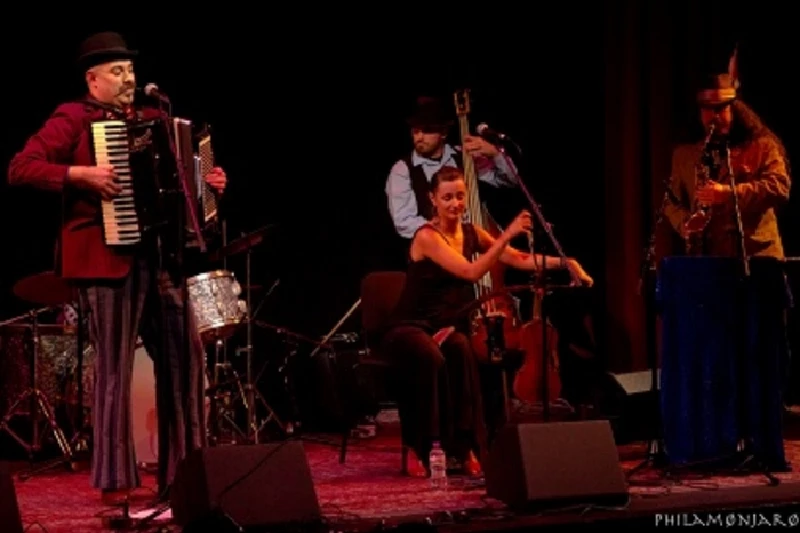
intro
Lisa Torem speaks to front man Eric Stern about his extraordinary band and vaudeville act Vagabond Opera about their recent album, 'Songs for Your Lives', and also opera, 'Queen of Knives'
Eric Stern has written for puppet theatres and dance companies, and even wrote an original opera, ‘Queen of Knives’ in 2010. His inspirations include Leonard Bernstein, Kurt Weill and Cole Porter. Originally from Philadelphia, he now resides in Portland, Oregon. He has shared the stage with Devotchka, the Decemberists, Balkan Beat Box, and a host of belly dancers and speaks multiple languages. With his ten-year band, Vagabond Opera, he sings original and traditional music from all over the world. A European-trained opera singer, Stern draws from steam punk, cabaret, Klezmer, Arabic and Eastern-European influenced music with Vagabond Opera, which reaches a broad, interactive audience. Most importantly, he never leaves home without his moustache and accordion. With Pennyblackmusic, Stern talks about songwriting, influences, his engaging band mates and the future… PB: What is unique about each band member in this sextet? ES: Well, let's begin with our artist roster. This is actually more of a repertory company than a band. I have worked with all of these artists for years, but like a mad captain in pursuit of a white whale I carefully select my crew before each tour. That said, I'll try to answer some of your questions: Robin Jackson: Robin is over 100 years old, but he managed to convince a genie to show him the fountain of youth (it's actually in New Jersey somewhere), so many of his songs are about his youth in Paris in the 1930s. He stands at five foot four inches and is eleven stone. I really don't do weight by stone, but I thought it would be fun to try to guess his weight for our British audience. Ursula Knudson: Ursula plays the saw and sings opera, but what is unique about her is that she can fill a hotel room with ‘People’ magazines and microwave dinners in less than fifteen minutes. It's like a super-power she has. I think she also speaks French, but so does all of France. Except for Brittany. Karolina Lux: Most awesome cabaret and belly dancer in the world! Is that unique enough? Well, guess what? There's more. She plays the trumpet. She sings. And she can recite the quadratic formula with absolutely no awareness of its application in real life. This is usually very common in high school students but she is over twenty-two years old! Do you remember the quadratic formula and not know its use? I didn't think so. Drew Nelson: He plays the bass and has dedicated his life to this. Pretty damned unique, I'd say. He also has tattoos he never shows anybody. He is from the extra solar planet "b" in the Auriga system. Xander Almeida: He is a Republican. Mark Burdon: Not only does Mark play percussion for us, but he does all the taxes and responds quickly to emails as well as fills out his calendar. This is very unique among musicians worldwide. He may be the only one who knows how to make money as well as stay sober for a whole tour. He also does most of the driving which is good. Mark makes spreadsheets and tracks merchandise and income. This enables the rest of us to make music and drink. I have never met a musician who makes spreadsheets. I have never met a musician who actually knows what a spreadsheet is; if you ask them they usually think it has something to do with sex. We let Mark handle all of the money. Mark is a very rich man. Skip Von Kuske: What is unique about Skip is his cello playing. Seriously, he is the best improvising cellist I have ever encountered or heard in my life. Eric Stern: That's me! Let the record show that I play accordion and sing opera, thus alienating many demographics. PB: Vagabond Opera has been together for a decade. Throughout your recording history the band has brought to life traditional French, Yiddish, Romanian and Russian arrangements, for example: 'Le Clochard de Paris,' 'Milord,' 'Papirossen' and 'Otchi Chornyia.' Why these songs and these stories? ES: Because we like them. PB: How do you research your material? ES: We used to use this very large building in our city called the library. I also would ask my grandmother and mother about the Yiddish and French stuff. The library cut its hours and my grandmother died. That leaves my mother. And a new phenomenon called "The Internet". It shows you things like how to spell phenomenon, but you can't always believe it. We also go to other countries and listen and talk to people. Sometimes we record without permission, but we find it better to not steal. PB: Are there songs you would record, but not play live, or vice versa? ES: We often play Hank Williams’ ‘Hey Good Lookin’. I am serious; I'll just stick it in the middle of a set to surprise everybody. We would never record it. I have regretted a few of our recordings: Mostly anything with me speaking Yiddish. It's bad Yiddish, I forged ahead without the proper research, and now it's on a recording for all of time. All of time, ha ha ha! PB: On your latest album, ‘Songs for Your Lives’, 'The Last Dance' is full of brilliant images such as "The red moon is rising like a dark horse from a cave." What inspired this song? ES: This is Robin Jackson's song so I'll tell you what I know. Robin swallowed a whole bottle of Absinthe and dreamed of dream of days gone by. I think he was referring to the apocalypse or using that imagery, which is funny as he is Jewish so that means that he was reading parts of the Bible that he is not supposed to read. As I am Jewish, I will be sure to report him to the Synagogue board. PB: There are a few recordings that touch on dark themes. On 'Penny,' the first line is: "The soldiers woke him up that night." 'King of the Gypsies' has an overall beautiful, but defiant edge and 'St. James Infirmary' was a popular American standard about a corpse. What bound these songs together? ES: As for the soldiers, I wrote that song and what I was trying to do was invoke imagery without being specific. I got the idea from Bob Dylan at the end of ‘Tangled Up in Blue’...I don't remember the exact lyrics, but he's saying something like "he started into dealing...," and you're like “What? Who started into dealing what?” I wanted to describe a scene without getting too specific and wanted the listener to fill in the rest. I also wrote ‘King of the Gypsies’ and again, totally seriously it was written after Xander and I had a pillow fight in a hotel room. I won, so take that defiant edge! PB: What comes first (melody, rhythm, theme, orchestration concept) when you compose original music? ES: Oh it's always different. It's actually fun to try and start with one of those that you don't do as much. I often start with lyrics or a concept, but sometimes a chord progression just comes to me. There are all sorts of ways to trick yourself, too. ‘Sing for Your Lives’. That was interesting. I spent two weeks in Poland and it was magnificent, chock-full of juicy experiences including getting into a street fight and so I thought, "I'm going to try to sit here at the end of all this and see if a melody comes to me, like it happens in the movies." It did. That never happens. PB: Instrumentally, the band draws inspiration from some unusual scales and metres. How would you characterize them? ES: I would characterize them as unusual. Unless you are from the places in the world where the scales and metres are from. Then I would characterize them as rast, hijazz, karlisma, ayoub, and sirto. And others PB: The band has been called "eclectic," but you must have started with some common influences. What are they and how have they changed through the years? ES: We started out as more of a klezmer band. And opera and jazz. Those were what I/we knew. We've evolved by exploring other forms and most of all by creating original music. Kurt Weill is a seminal influence in my musical life. PB: Improvisation plays a big part in your onstage performance, yet there seems to be a lot of call and response between certain band members. Is this planned out? ES: It's not planned out. I'd like to have a word with our French readers: Bonjour et merci pour lire audjourd'hui. J'espere que tout va bien et que vous aimez notre petit groupe des Vagabonds. D'accord...maintenant je peux parler. Vous souvenez Jeanne D'arc? Moi aussi. Maintenant ce le temp de aller au angleterre! Les Angleterres sont vulnerables maintenant! Va, aller vous en! Angleterre ce la notre!...et bien je veux dire merci a Edith Piaf. PB: You have stated that the band is "trying to create a sense of ritual." Parts of the act seem to be drawn from liturgical sources. How do you translate something like the fervour of a cantorial service into pop music? ES: It's less about fervour and more about creating peaks and resting points for an audience to bring them to higher and higher levels of ecstasy. It's only in the past three or four hundred years or even less that music has been in the service of a formal "concert." Before that, music functioned mostly to cement social bonds (as well as scare the hell out of an opponent in war). We are doing something in-between a little, as many audiences are not quite prepared to fully release all inhibitions. I don't necessarily want them to, but I do want to create a shared imaginative landscape. PB: The band performed ‘Queen of Knives’, an opera. What was the premise of this work and how was it received? Will you embark again on something similar? ES: It's an opera I wrote. The premise is about a circus act on the skids in the 1950s, a brother and sister knife-throwing act and the belly dancer that comes between them. It was nice to come full circle and compose an opera and then sell it out every night. So yes, I will embark on something similar again. PB: During a performance of ‘Romanian Hora’, you told the audience that if they felt like "getting up on the table and smashing glasses, you have our permission." Has that happened yet? ES: No! Come on everybody! PB: "Vagabond" implies someone who is left out of the mix and yet your music brings people together, though, in an unconventional way. Can you explain this? ES: I cannot. Or I refuse to. Or I am being enigmatic. Or am I? PB: What have you learned about yourself over the last decade by being in Vagabond Opera? ES: That is a good question. I have learned to listen to my fellow performers, even when what they have to say is difficult. And I've learned to listen to them, musically, onstage. I have learned a great deal about soloing by standing next to Skip for all of these years. You know he paces out his solos not only for a show, but also for a whole string of shows. I have also learned that keeping personnel is tricky when you have top-notch people, because they are always doing so many other projects and so I have had to trust in the abundance of the universe in sending more musicians my way. Finally at the beginning, in my mind, I courted critics. That is, I thought the biggest deal would be to get a review in ‘The New Yorker’ or something like that, but what I've learned is that the people, who have been with us, often for years, are our fans and they are who I play for now, not some platonic ideal of a ‘New Yorker’ critic. This ensemble started out as people playing for the love of music and there was a time, in our middle years, when we got swept up in what Salman Rushdie calls the current-day "cult of celebrity." We, I, wanted to be famous. Well I'm 42 now, and once I hit my late thirties I started to let that go, and, lo and behold, I am back to making music because I love it, I love the fans, and back to studying and learning more and more. I just picked up a new instrument for myself: the Oud. And so I am back to beginner's mind fully. It is like a refreshing glass of water in a desert. I am spokesperson right now, but I love and am friends with every member of this ensemble and I couldn't do this without them. PB: What do you see happening in 2013? ES: I think that the U.S. will end the war on terror, and that the entire world will realize that it makes more sense to work cooperatively, rather than be at odds; after reducing carbon-emissions, earth people will look into colonizing Mars. Drones will be destroyed and people will have fewer babies. More world leaders will be women than men. And while porn will still be legal, men and women will realise that they don't need it and instead will connect with each other more sexually as well as deeply emotionally; this in turn will reduce our dependence on government and strengthen community. The end of the war on drugs will occur as well. More people will learn accordion. I know the last statement is a bit idealistic, but I can dream, can't I? PB: Thank you. The photographs that accompany this article were taken by Philamonjaro at www.philamonjaro.com.
Picture Gallery:-
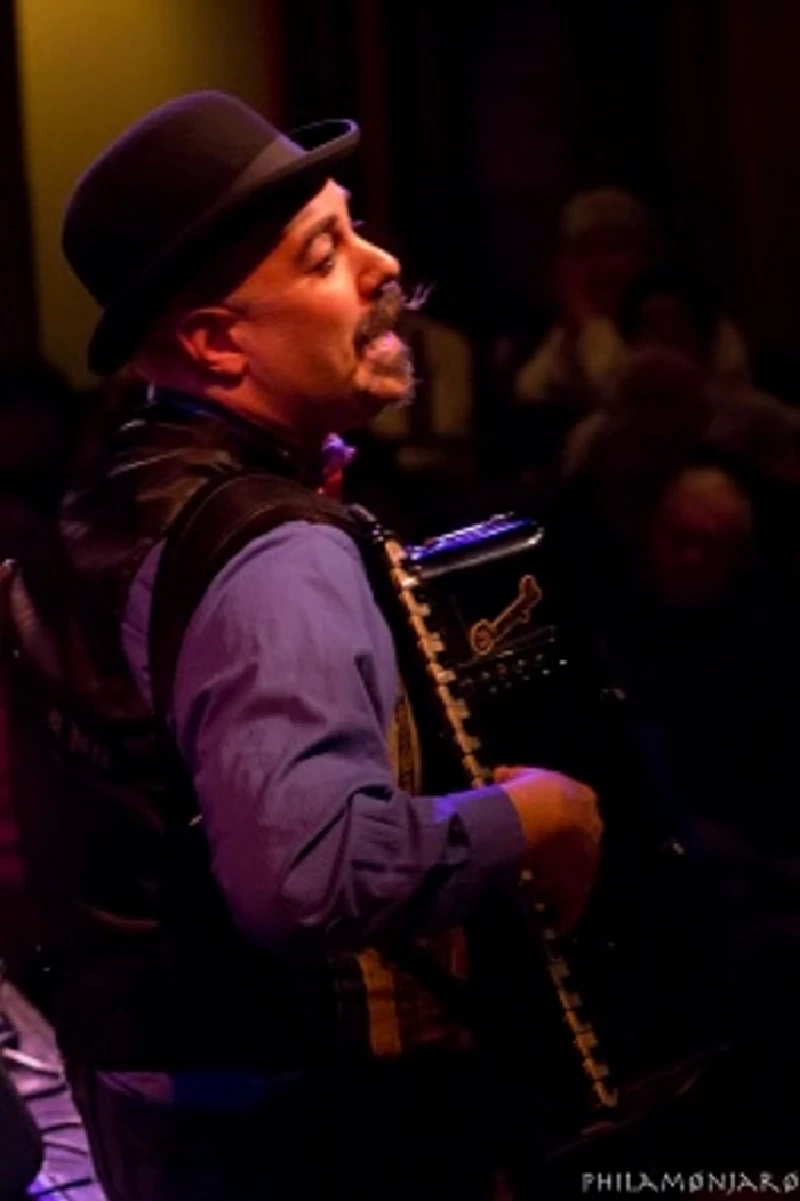
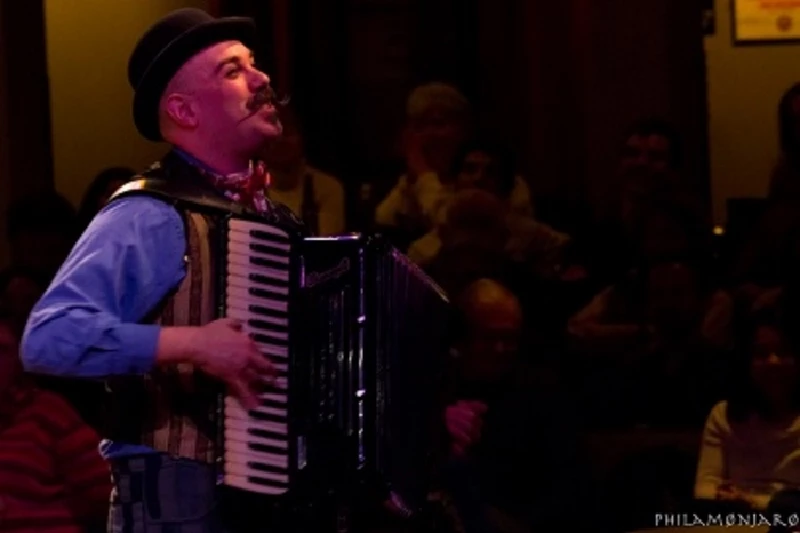
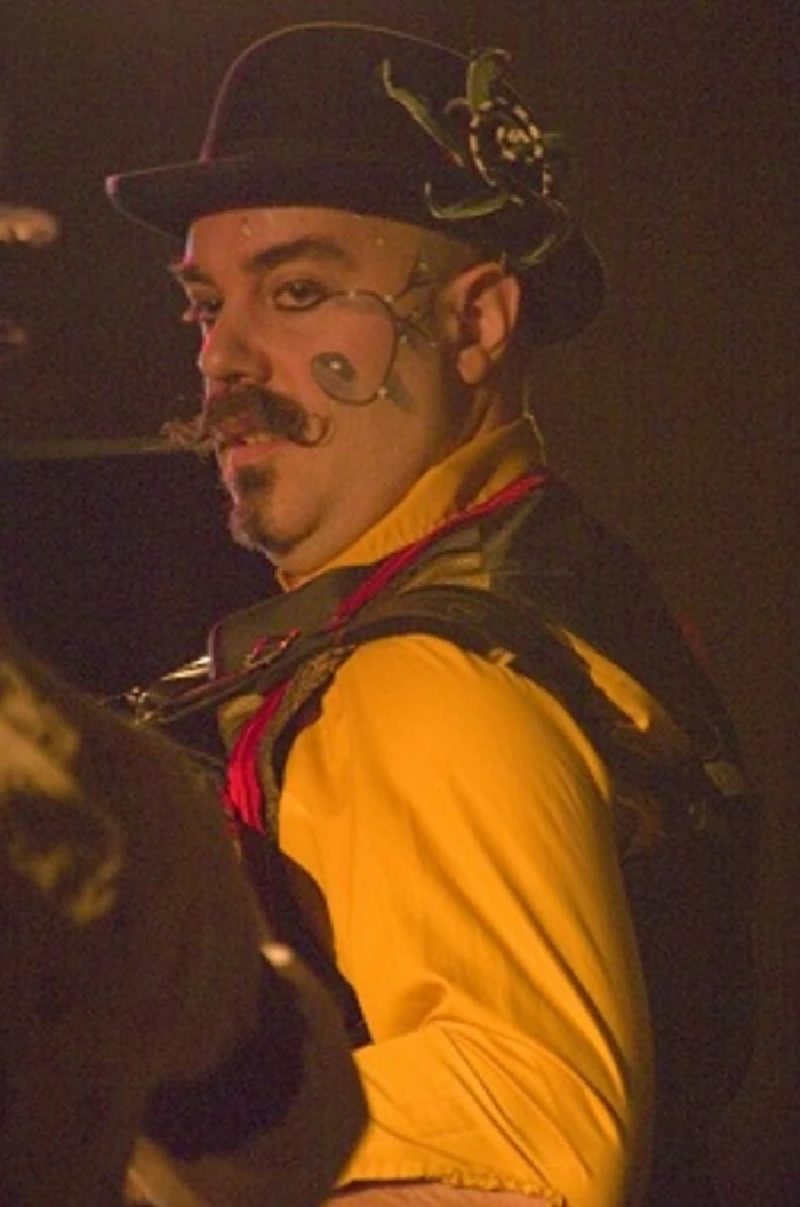
live reviews |
|
Old Town School of Folk Music, Chicago, 30/10/2013 |
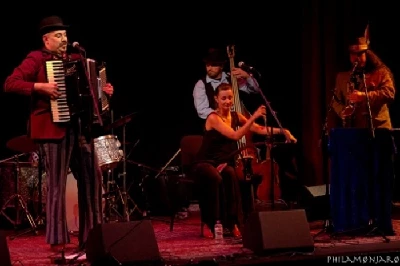
|
| Lisa Torem enjoys Portland, Oregon-based group Vagabond Opera's unorthodox and cinematic blend of cabaret rock at the Old Town School of Folk Music in Chicago |
most viewed articles
current edition
Peter Doherty - Blackheath Halls, Blackheath and Palace Halls, Watford, 18/3/2025 and 21/3/2025Armory Show - Interview with Richard Jobson
Liz Mitchell - Interview
Deb Googe and Cara Tivey - Interview
Lauren Mayberry - Photoscapes
Max Bianco and the BlueHearts - Troubadour, London, 29/3/2025
Garfunkel and Garfunkel Jr. - Interview
Maarten Schiethart - Vinyl Stories
Clive Langer - Interview
Sukie Smith - Interview
previous editions
Heavenly - P.U.N.K. Girl EPBoomtown Rats - Ten Songs That Made Me Love....
Trudie Myerscough-Harris - Interview
Doris Brendel - Interview
Beautiful South - Ten Songs That Made Me Love...
Kay Russell - Interview with Kay Russell
Dwina Gibb - Interview
Pulp - Ten Songs That Made Me Love...
Barrie Barlow - Interview
Sound - Interview with Bi Marshall Part 1
most viewed reviews
current edition
Davey Woodward - Mumbo in the JumboNigel Stonier - Wolf Notes
Wings - Venus and Mars
Only Child - Holy Ghosts
Kate Daisy Grant and Nick Pynn - Songs For The Trees
Neil Campbell - The Turnaround
Philip Jeays - Victoria
Darkness - Dreams On Toast
Suzanne Vega - Flying With Angels
Charles Ellsworth - Cosmic Cannon Fodder
Pennyblackmusic Regular Contributors
Adrian Janes
Amanda J. Window
Andrew Twambley
Anthony Dhanendran
Benjamin Howarth
Cila Warncke
Daniel Cressey
Darren Aston
Dastardly
Dave Goodwin
Denzil Watson
Dominic B. Simpson
Eoghan Lyng
Fiona Hutchings
Harry Sherriff
Helen Tipping
Jamie Rowland
John Clarkson
Julie Cruickshank
Kimberly Bright
Lisa Torem
Maarten Schiethart